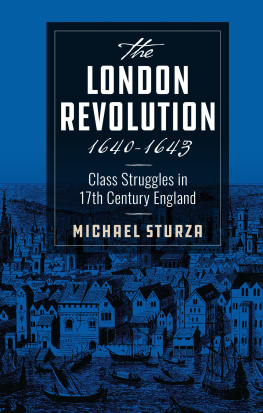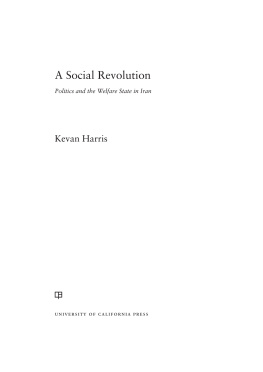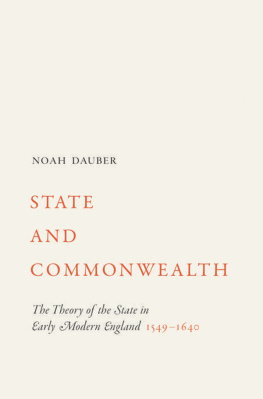ROUTLEDGE LIBRARY EDITIONS: PURITANISM
Volume 6
SOCIAL PROBLEMS AND POLICY DURING THE PURITAN REVOLUTION 16401660
First published in 1930 by George Routledge & Sons Ltd.
This edition first published in 2021
by Routledge
2 Park Square, Milton Park, Abingdon, Oxon OX14 4RN
and by Routledge
52 Vanderbilt Avenue, New York, NY 10017
Routledge is an imprint of the Taylor & Francis Group, an informa business
1930 George Routledge & Sons Ltd.
All rights reserved. No part of this book may be reprinted or reproduced or utilised in any form or by any electronic, mechanical, or other means, now known or hereafter invented, including photocopying and recording, or in any information storage or retrieval system, without permission in writing from the publishers.
Trademark notice: Product or corporate names may be trademarks or registered trademarks, and are used only for identification and explanation without intent to infringe.
British Library Cataloguing in Publication Data
A catalogue record for this book is available from the British Library
ISBN: 978-0-367-56981-5 (Set)
ISBN: 978-1-00-311164-1 (Set) (ebk)
ISBN: 978-0-367-61012-8 (Volume 6) (hbk)
ISBN: 978-1-00-310286-1 (Volume 6) (ebk)
Publishers Note
The publisher has gone to great lengths to ensure the quality of this reprint but points out that some imperfections in the original copies may be apparent.
Disclaimer
The publisher has made every effort to trace copyright holders and would welcome correspondence from those they have been unable to trace.
First published in 1930 by
George Routledge & Sons Ltd.
Reissued in 1966
by
Routledge & Kegan Paul Ltd.
No part of this book may be reproduced in any form without permission from the publisher, except for the quotation of brief passages in criticism.
PRINTED IN GREAT BRITAIN
BY COMPTON PRINTING WORKS LTD.
I n the following pages an attempt has been made to describe some aspects of social and economic development, and the corresponding changes in social and economic thought, which took place between the years 1640 and 1660. Attention has been concentrated mainly upon social thought and policy, and economic organization has been discussed only in so far as has been necessary to throw light upon this side of the subject.
It is not always recognized that the discredit of the Stuart monarchy and the Commonwealth experiment marked the beginning of a new epoch in social, no less than in political, history. The most obvious fact which emerges from a study of the economic history of the time is that of widespread disorganization and depression in industry and agriculture, and a consequent increase of poverty and unemployment. The reaction of contemporary thought and policy to this environment is unusually interesting and significant. Traditional authority in church and state was weakened, and to a huge extent overthrown, and powerful forces were released which had hitherto been denied the opportunity of free development.
The first chapter indicates, by way of introduction, some of the forces which were at work to change traditional conceptions of social expediency, and which, in many cases, came to a head during the Interregnum. As this part of the subject has been treated by other writers, secondary authorities have been freely used, especially in the earlier sections of the chapter. The succeeding chapters discuss in some detail problems connected with industry, agriculture, and poor relief, and in the last chapter a sketch of general social projects has been given. The abundance of material has made it necessary to limit the scope of the work, and, except for incidental references, finance and foreign trade have been deliberately omitted.
A list of the sources which have been used is given below. The manuscripts in the Guildhall Record Office and in the archives of the City Companies have proved especially valuable. In this connection I wish to thank Mr. A. H. Thomas, Clerk of the Records, City of London, who has helped me in many ways. My thanks are also due to the following Companies for allowing me to examine some of their records: the Goldsmiths, the Clothworkers, the Merchant Taylors, the Saddlers, the Weavers, the Carpenters, the Pewterers, the Leathersellers, and the Cutlers.
I should like to express my gratitude to Miss M. G. Jones and the authorities of Girton College for awarding me in successive years the Cairnes Research Studentship and the Old Girtonions Research Studentship, and to the University of London for assisting the publication of this work. My friends, Mrs. George Chambers and Miss M. Midgley, have helped me very greatly in preparing the manuscript for the Press, and my best thanks are due to them. Miss M. Honeybourne has kindly made an Index for me.
To Mr. R. H. Tawney, under whose direction I worked for three years, I owe a debt which it is impossible to express.
M argaret J ames .
March, 1980.
None more fond of a King than the English, yet they departed from Him to ease their purses and their Consciences.
Peter Chamberlen,
The Poor Mans Advocate, 1649.
Faith is a successful grace, and hath a promise of prospering.
Matthew Wren,
Monarchy Asserted, 1660.
They have cast all the mysteries and secrets of government before the vulgar, and taught the soldiery and the people to look into them and ravel back all governments to the first principles of nature.
Clement Walker,
History of Independency, 1661.
T he twenty years between 1640 and 1660 are often regarded merely as an interruption in the main stream of social and economic development, and the transition from the government of Laud and Strafford to an England dominated by Shaftesbury and Pepys and Nell Gwynne is effected without much attempt at explanation. Yet during the Civil Wars and Commonwealth a lasting change took place in the theory of social relationships. With King Charless head fell the last remnants of the mediaeval ideal of divinely appointed authority which had arisen from the flames of the Reformation in the form of the Divine Right of Kings. This theory was important from a social as well as from a political point of view, and, though the main conflict took place in the political sphere, it was urged forward by the force of a widespread discontent with the Governments conceptions of social expediency.
One of the pleasant myths which help to give us a feeling of superiority towards the rest of Europe is the belief that Englishmen have never submitted to any considerable measure of Government interference in matters of business or private life. We all know that Laud cut off mens ears because they would not bow the knee to Rome, and that Charles imprisoned those who would not submit to illegal taxation, but the knowledge that these acts were the worst side of a comprehensive, if badly administered, system of paternal control is not widespread. Miss Leonard has said of the Eleven Years Tyranny that it was remarkable for more continuous efforts to enforce socialistic measures than have been made by the central Government of any other great European country.
When applied to economic and social life, this view was interpreted to mean Government interference in every transaction where it was possible for private interest to run counter to the general good. Wages, prices, exchanges, and the general conduct of industry and agriculture were submitted to frequent criticism and control. The cloth industry was a particular object of concern, partly because of its national importance and partly because it was organized upon lines which gave unusual power to the capitalist. In 1621, when the master clothiers wanted to lock out their workmen during a period of depression, the Council directed the justices to order them to keep the men in employment.







